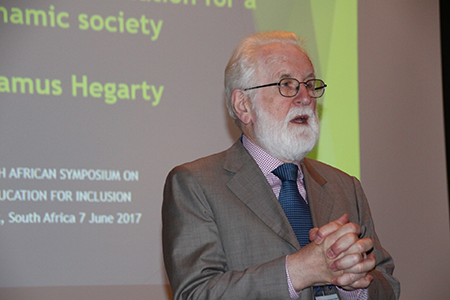The Optentia research focus area on the North-West University’s (NWU’s) campus in Vanderbijlpark and the Faculty of Education Sciences on the NWU’s campus in Potchefstroom, in collaboration with the Flemish Association for Development, Cooperation and Technical Assistance (VVOB) and with the sponsorship of the European Union, were the proud hosts of the 2017 symposium.
Prof Seamus Hegarty from the University of Warwick in England started the conversation as the first keynote speaker with a provocative talk entitled “If not us, then who? Dynamic teacher education for a dynamic society”.
At a time of unprecedented social and technological change, schools and teachers become more important than ever. A key requirement for progress is a reformed, dynamic teacher education. Prof Hegarty identified three areas of concern: the school system, the inclusion discourse as well as teachers and training.
The groups of learners most often excluded from education are girls, disabled learners, as well as learners in rural areas and war zones. Schools are not fit for purpose since little has changed in school systems over a long period of time, and schools are charged with preparing learners for an uncertain future reality. According to Prof Hegarty, schools have two important responsibilities: to develop all learners capacities to the full; and to ensure learners have good lives as children.
“By striving for proper access to schools that are inclusive for different learner needs and by monitoring the progress made, national school systems can better serve both the learners and the community as a whole,” said Prof Hegarty.
“In addition, schools must be made relevant by first asking the question ‘what makes someone an educated person today?’. They should then assess accordingly whether the curriculum is appropriate and adapt it where needed, and finally tackle the manner of assessment.”
According to Prof Hegarty, initial teacher training must finally ensure new teachers are well versed in the diverse learner needs they may encounter in their classroom and how to accommodate them. Continuous professional development must also include further study to augment practicing teachers’ knowledge and skills on inclusive education.
Read more about the projects within Optentia research focus area on inclusive education in schools.

Prof Seamus Hegarty.
